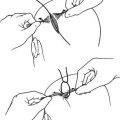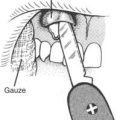MOTION SICKNESS
Motion sickness (seasickness, or “mal de mer”) is a common, annoying, and sometimes disabling problem for boaters and divers. Motion sickness is a complex phenomenon that involves the cerebellum (the part of the brain that controls, among other things, balance), vestibular system (labyrinth of the inner ear that plays a major role in the control of equilibrium), the nerve connections between the eyes and the inner ear, and the gastrointestinal tract. It is made worse by alcohol ingestion, emotional upset, noxious odors (e.g., boat exhaust fumes), and inner ear injury or infection. Most persons adapt to real motion after a few days, but may require treatment until they are adjusted to the environment.
1. Keep your eyes fixed on a steady point in the distance. If on board a ship, stay on deck. Splash your face with cold water. If the seas are rough, be careful to not slip or fall overboard. If you can have someone next to you who is not suffering, that is better than leaning over the rail by yourself to vomit when you are dizzy.
2. Use the ReliefBand device. It is advertised to relieve nausea and vomiting with gentle, noninvasive electrical stimulation on the underside of the wrist. It can be used before or after symptoms begin; carries no restrictions on food, beverages, or the use of medications; and has no druglike side effects. The device looks like a wristwatch. The Adventurer model contains a battery-powered electrical stimulator that is easily adjustable for five different stimulation levels. The device is positioned over the P6 acupuncture site (the Neiguan, or Nei Kuan, point on the pericardial meridian). This is located 2 fingerbreadths toward the heart from the wrist joint between the two prominent finger flexor tendons. When the device is turned on, a pulse is generated every 4 seconds, and the user feels the episodic tingling sensation. It is theorized that the electrical signal transmitted via the median nerve in the wrist interrupts the nausea and vomiting messages that are transmitted between the brain and the stomach. The only side effect noted so far with the device is rare irritation where the electrodes make contact with the skin. This is easily managed by moving the device to the other wrist.
3. Some persons report that wearing a “sea band” is helpful. This is a knitted, elastic stretch band with a button(s) that applies pressure to an acupuncture point(s). This would not be expected to be nearly as effective as the ReliefBand device, but might help out in a pinch.
4. Ingest meclizine (Antivert, Bonine) 25 mg, cyclizine (Marezine) 50 mg, or dimenhydrinate (Dramamine) 50 mg orally every 4 to 6 hours, or cinnarizine (Sturgeron) 15 mg every 8 hours as necessary to prevent and control motion sickness. These are adult doses. To be most effective, the first dose of medication should precede the environmental change by 1 hour. Medication given after the onset of seasickness will often be ineffective. Obviously, if you are vomiting so severely that you cannot keep any medication down, you may need to use a suppository, such as prochlorperazine (Compazine) 25 mg or promethazine (Phenergan) 25 mg, noting that these drugs won’t cure the motion sickness—they might control vomiting, but have the side effect of drowsiness.
5. Place a transdermal scopolamine patch (Transderm-Scop 1.5 mg) on the skin behind the ear. This patch releases the drug slowly through the skin and can be very effective against motion sickness for up to 3 days. Side effects include drowsiness, blurred vision (sometimes with a dilated pupil in the eye on the side of the patch), decreased sweating, difficulty with urination (particularly in elderly males with enlarged prostate glands), dry mouth, and a propensity to be susceptible to heat illness during times of heat exposure. Persons with glaucoma should not use the patch. On a rare occasion, a person who uses a patch can become delirious or even psychotic as a side effect. Normal behavior returns within a few hours after the patch is removed.
6. Reduce head movement. Do not consume alcoholic beverages, because these make you more prone to vertigo. If you are on a large boat that is rocking bow to stern, seek the middle (equilibrium) of the vessel, so that motion is minimized. Look out from the boat and find a broad view of the horizon. Don’t do close-focused visual tasks such as reading, writing, and navigation. If you are becoming motion sick and can’t control your symptoms, you might find some relief by lying faceup in a well-secured and ventilated bunk. Close your eyes and try to sleep.
7. Some people recommend “keeping something in your stomach” during a bout of motion sickness. You can put something in there, but if you are truly sick, it won’t stay there for long. Try to maintain your fluid intake with sips of something like an electrolyte-containing sports beverage (e.g., Gatorade or Gatorade G2). If you are known to suffer from motion sickness, take particular care to be well hydrated before your journey, because you will at a minimum have decreased appetite and fluid intake, and in the worst case, lose a fair bit of fluid by vomiting. While some persons recommend a light diet with predominantly carbohydrates, there is no evidence that any particular food or diet is beneficial. Ginger (Zingiber officinale) is sometimes recommended to curb nausea. It is taken as 1,000 mg (two 500 mg capsules) every 6 hours, supplemented by gingersnap cookies, ginger ale, and candied ginger.





